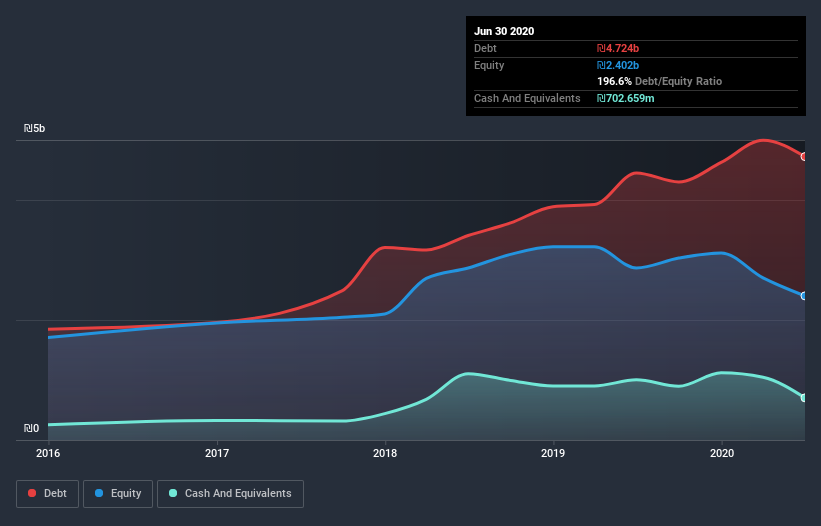Warren Buffett famously said, 'Volatility is far from synonymous with risk.' It's only natural to consider a company's balance sheet when you examine how risky it is, since debt is often involved when a business collapses. Importantly, Fattal Holdings (1998) Ltd (TLV:FTAL) does carry debt. But the more important question is: how much risk is that debt creating?
What Risk Does Debt Bring?
Debt is a tool to help businesses grow, but if a business is incapable of paying off its lenders, then it exists at their mercy. If things get really bad, the lenders can take control of the business. However, a more usual (but still expensive) situation is where a company must dilute shareholders at a cheap share price simply to get debt under control. Of course, plenty of companies use debt to fund growth, without any negative consequences. When we think about a company's use of debt, we first look at cash and debt together.
View our latest analysis for Fattal Holdings (1998)
What Is Fattal Holdings (1998)'s Debt?
As you can see below, at the end of June 2020, Fattal Holdings (1998) had ₪4.72b of debt, up from ₪4.45b a year ago. Click the image for more detail. However, because it has a cash reserve of ₪702.7m, its net debt is less, at about ₪4.02b.

How Strong Is Fattal Holdings (1998)'s Balance Sheet?
We can see from the most recent balance sheet that Fattal Holdings (1998) had liabilities of ₪1.92b falling due within a year, and liabilities of ₪16.4b due beyond that. Offsetting these obligations, it had cash of ₪702.7m as well as receivables valued at ₪368.9m due within 12 months. So its liabilities outweigh the sum of its cash and (near-term) receivables by ₪17.3b.
This deficit casts a shadow over the ₪4.74b company, like a colossus towering over mere mortals. So we'd watch its balance sheet closely, without a doubt. After all, Fattal Holdings (1998) would likely require a major re-capitalisation if it had to pay its creditors today.
We use two main ratios to inform us about debt levels relative to earnings. The first is net debt divided by earnings before interest, tax, depreciation, and amortization (EBITDA), while the second is how many times its earnings before interest and tax (EBIT) covers its interest expense (or its interest cover, for short). The advantage of this approach is that we take into account both the absolute quantum of debt (with net debt to EBITDA) and the actual interest expenses associated with that debt (with its interest cover ratio).
Weak interest cover of 0.052 times and a disturbingly high net debt to EBITDA ratio of 11.1 hit our confidence in Fattal Holdings (1998) like a one-two punch to the gut. The debt burden here is substantial. Even worse, Fattal Holdings (1998) saw its EBIT tank 94% over the last 12 months. If earnings continue to follow that trajectory, paying off that debt load will be harder than convincing us to run a marathon in the rain. When analysing debt levels, the balance sheet is the obvious place to start. But it is Fattal Holdings (1998)'s earnings that will influence how the balance sheet holds up in the future. So if you're keen to discover more about its earnings, it might be worth checking out this graph of its long term earnings trend.
Finally, a company can only pay off debt with cold hard cash, not accounting profits. So we always check how much of that EBIT is translated into free cash flow. During the last three years, Fattal Holdings (1998) burned a lot of cash. While that may be a result of expenditure for growth, it does make the debt far more risky.
Our View
On the face of it, Fattal Holdings (1998)'s EBIT growth rate left us tentative about the stock, and its level of total liabilities was no more enticing than the one empty restaurant on the busiest night of the year. And even its interest cover fails to inspire much confidence. It looks to us like Fattal Holdings (1998) carries a significant balance sheet burden. If you play with fire you risk getting burnt, so we'd probably give this stock a wide berth. The balance sheet is clearly the area to focus on when you are analysing debt. However, not all investment risk resides within the balance sheet - far from it. Be aware that Fattal Holdings (1998) is showing 4 warning signs in our investment analysis , and 2 of those are concerning...
Of course, if you're the type of investor who prefers buying stocks without the burden of debt, then don't hesitate to discover our exclusive list of net cash growth stocks, today.
If you’re looking to trade Fattal Holdings (1998), open an account with the lowest-cost* platform trusted by professionals, Interactive Brokers. Their clients from over 200 countries and territories trade stocks, options, futures, forex, bonds and funds worldwide from a single integrated account. Promoted
New: AI Stock Screener & Alerts
Our new AI Stock Screener scans the market every day to uncover opportunities.
• Dividend Powerhouses (3%+ Yield)
• Undervalued Small Caps with Insider Buying
• High growth Tech and AI Companies
Or build your own from over 50 metrics.
This article by Simply Wall St is general in nature. It does not constitute a recommendation to buy or sell any stock, and does not take account of your objectives, or your financial situation. We aim to bring you long-term focused analysis driven by fundamental data. Note that our analysis may not factor in the latest price-sensitive company announcements or qualitative material. Simply Wall St has no position in any stocks mentioned.
*Interactive Brokers Rated Lowest Cost Broker by StockBrokers.com Annual Online Review 2020
Have feedback on this article? Concerned about the content? Get in touch with us directly. Alternatively, email editorial-team (at) simplywallst.com.
About TASE:FTAL
Fattal Holdings (1998)
Owns and operates hotels in Israel and internationally.
Proven track record with very low risk.
Market Insights
Community Narratives



